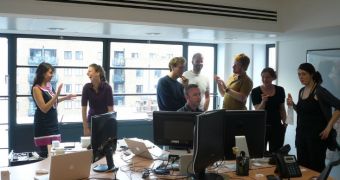Parents are always brought to the brink of despair when their children make the same mistakes they did, after being warned repeatedly that certain actions are bad. While in a perfect society, the mistakes on one individual would never get repeated, researchers say that the current state of affairs may actually be one of the most important engines of great innovation our species has. A new paper from experts at the University of St. Andrews shows that repeating mistakes may in the end contribute to our species' ability to adapt, PhysOrg reports.
The international collaboration of scientists that reached this conclusion says it only applies to people who accidentally make the same mistakes as others before them, and not necessarily to those who do it on purpose, to prove a point. Details of the investigation appear in the April 9 issue of the esteemed publication Science. UST School of Biology professors Kevin Laland and Dr. Luke Rendell conducted the team, which also included experts from the University of California in Los Angeles (UCLA), and the Stanford, Stockholm and Bologna universities. The research initiative was funded by the European Union.
“Human culture is widely thought to underlie the extraordinary demographic and ecological success of our species and one of the foundations of culture is copying. Many animals, including fish, mammals, birds and even some insects, acquire vital life skills and knowledge through low cost copying. Copying pays off because the individuals we copy typically perform the most effective behavior in their repertoire. In doing so, they inadvertently filter behavior, making adaptive information available for others,” Laland explains.
“Even if an individual copies at random, they still do better than someone learning through trial and error because the behavior available to copy is amongst the best around. This study helped us to understand why copying is so widespread in nature,” the expert adds. “The most successful strategies timed their copying for when payoffs dropped, evaluated current information based on its age, and judged how valuable it will be in the future. This capacity to think about the past and future, known as mental time travel, may be the secret ingredient underlying the super-effectiveness of human copying,” concludes Dr. Rendell.

 14 DAY TRIAL //
14 DAY TRIAL //